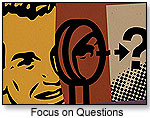|
|
Event Marketing Guru’s Corner: How to Handle Objections Sweep Away Deflections to Answer Prospects’ Core Concerns
AVOID DIVERSIONS  After the stock crash of 1987, I remember outrageous responses to client concerns. In one case, a disgruntled client called a senior broker asking how his XYZ stock (which had plummeted from $15 to $3 per share) was doing that day. Ed responded with, "I'm fine Bob … how are you?" Another client demanded to know why Ed had informed him that his downwardly spiraling stock was "on the move" earlier that day. "Joe, I said it was moving. I never said which way!" Ed justified. His uncanny knack for absurd diversions awarded him little, if any, client loyalty. After the stock crash of 1987, I remember outrageous responses to client concerns. In one case, a disgruntled client called a senior broker asking how his XYZ stock (which had plummeted from $15 to $3 per share) was doing that day. Ed responded with, "I'm fine Bob … how are you?" Another client demanded to know why Ed had informed him that his downwardly spiraling stock was "on the move" earlier that day. "Joe, I said it was moving. I never said which way!" Ed justified. His uncanny knack for absurd diversions awarded him little, if any, client loyalty. When effectively handling objections, the most important task is to identify the real reason a prospect will not buy in the first place. A costly mistake is attempting to answer objections that do not exist. Over 70 percent of your prospects' first objections are false objections designed to end the sales call or disengage in the communications process. You can't overcome an objection of which you are unaware; thus, the actual challenge is to pinpoint the real objection and manage it proficiently. TEST OBJECTIONS WITH QUESTIONS One of the most effective ways to identify the real objection is to assume the others away. If the prospect says "I'm not interested,” you must courteously probe further. "Obviously, you have some reason for feeling that way, John. Would you mind if I asked you what that might be?" You're prospect might respond with, "I just don't have the time to deal with anything else right now." It's time for you to test this objection for validity by assuming it away. "Let's assume for the moment, John that your valuable time were not an issue at all. Then, in your opinion, do you feel that a solution that saves you so much time and money would benefit you?" Your prospect might respond, "Well, no, I really don't think so.”  You see, time is not really the issue at all. The real objection is something else, and you must uncover it. Continue with, "I understand how you feel, John. Obviously, you have some other reason for saying that. Would you mind if I asked you to share with me what THAT might be?" You see, time is not really the issue at all. The real objection is something else, and you must uncover it. Continue with, "I understand how you feel, John. Obviously, you have some other reason for saying that. Would you mind if I asked you to share with me what THAT might be?" If you've built a solid foundation for communicating by establishing strong rapport and credibility, the prospect will almost always continue to engage you. John might respond, "Well, I really don't have the necessary money budgeted for this." Again, you should assume this objection away in order to find out if it is real. Proceed with, "John, I certainly understand how you feel. I understand budgets, and deal with them every day. Nonetheless, let's assume for a minute that budget were not an issue at all. Then, in your opinion, do you feel that this proven and profitable solution would benefit you and your organization?" LOOK FOR BUYING SIGNALS John might serve up another objection, or might respond with "yes." As for the third and forth objections, welcome them. More often than not, they are buying signals that are silently saying to you, "This sounds interesting. Please allay my concerns." If you receive more objections, you should continue to politely explore until you uncover the real objection. If John says, "Well, yes, I believe so. But, I DO have budget issues," you have now uncovered the real objection, and more than half of your challenge has been successfully met. In effectively addressing the real objection, you should never try to overcome it, as this often translates into telling the prospect that he or she is wrong. Try selling anything to anyone after telling them that they are wrong. Instead, you should try to substantially reduce the objection in size, to manage it effectively. This means positively and persuasively communicating the benefits and value of your proposed solutions while minimizing the importance of the objection. You might respond, "I understand how you feel, John. In fact, some of our most successful clients today also mentioned that at first … until they actually tried our solution and enjoyed its countless benefits. This puts you in absolute control of maximizing your organizations' bottom line with our __________ feature. Profitability … that's what you really want, John. Isn't it?" DON’T OVERCOME … ANSWER Once you've isolated the real objection, turn it into a question. It's easier to answer a question in the prospect's mind than it is to overcome an objection. Once you've isolated "budget" as the real issue, you might proceed with, "That brings up a question, John. Could you and your organization benefit and profit greatly from our proven solutions despite budgetary issues?” Then, immediately "tip the mental buying scales" in your favor by accentuating your solution's benefits and value, while minimizing the importance of the "question." Another effective method of managing the real objection is to turn it into the "very reason that you need this solution in the first place." If an exhibition supplier offers "customization" as its distinctive selling proposition and the prospect says, "But my event is different than all of the others," the timing is ideal to softly rebut with "John, I understand just how distinctive and different your event is from the others. Isn't that the very reason that you need a custom-tailored solution that perfectly and cost-effectively fits your event … as opposed to a one-size-fits-all, off-the-shelf solution?" I genuinely believe you will find these techniques helpful and fruitful in your professional pursuits. Always, remember that there is no such thing as a good technique without good intentions and customer-centric motives to support them. Effective communications are only virtuous if they are a natural outgrowth of a principle-centered core. Pledge to never enter into any transaction that does not benefit everyone that it touches. In the long run, integrity is your most powerful selling tool.  Writer's Bio: Charles W. Allen is an independent consultant for professional event marketing solutions and specializes in sales training, motivational speaking and maximizing sponsorship sales. He also serves as executive director of the International Economic Alliance, which originated at Harvard University. Read more articles by this author Writer's Bio: Charles W. Allen is an independent consultant for professional event marketing solutions and specializes in sales training, motivational speaking and maximizing sponsorship sales. He also serves as executive director of the International Economic Alliance, which originated at Harvard University. Read more articles by this author |
| |||||||||||||||||||||||||||||||||
Disclaimer Privacy Policy Career Opportunities
Use of this site constitutes acceptance of our Terms of Use.
© Copyright 2025 PlayZak®, a division of ToyDirectory.com®, Inc.



